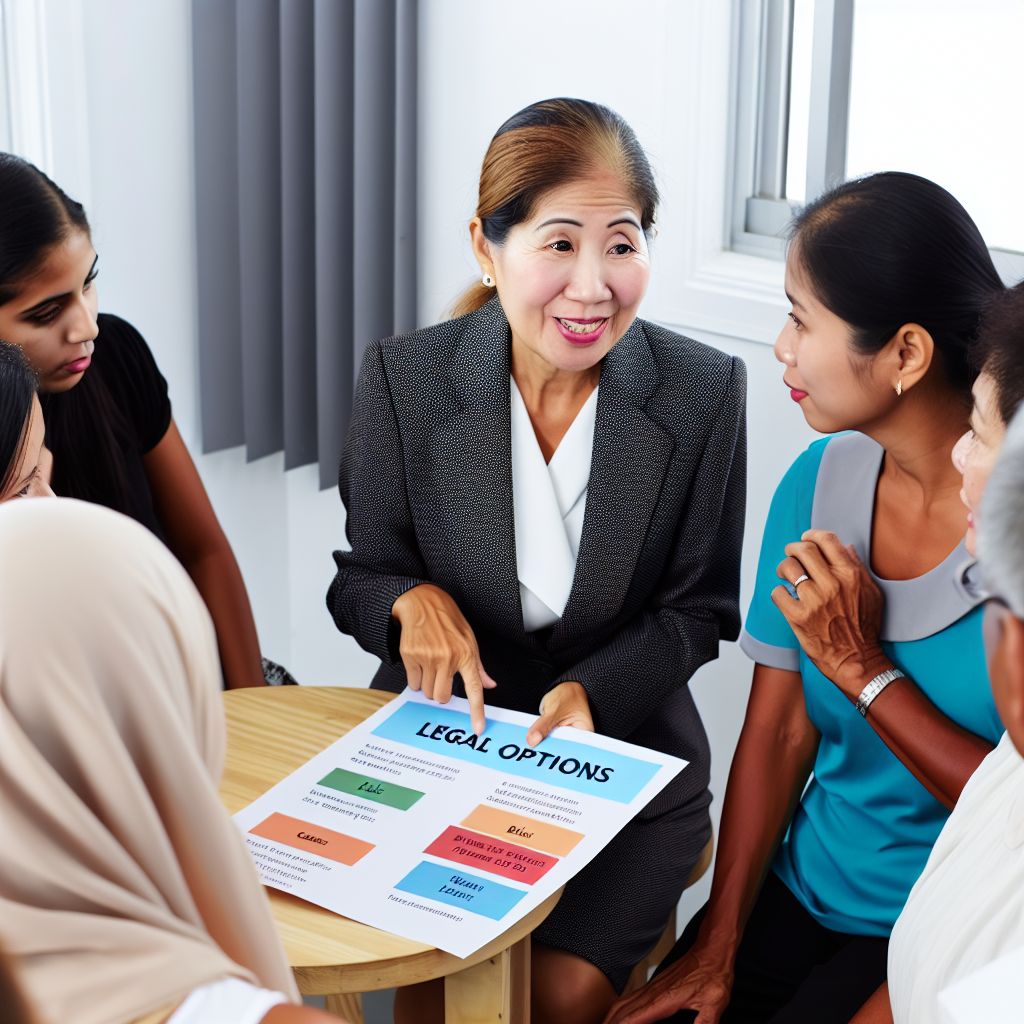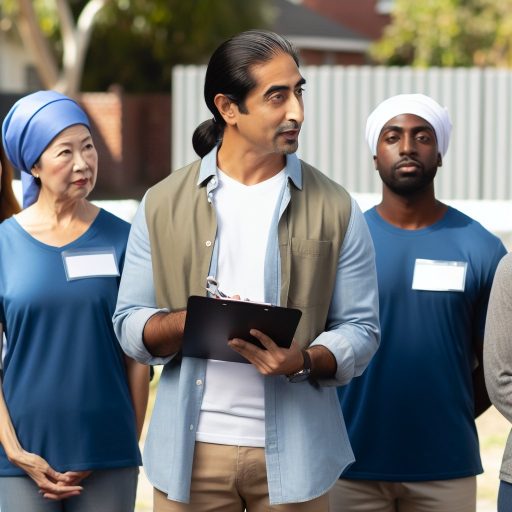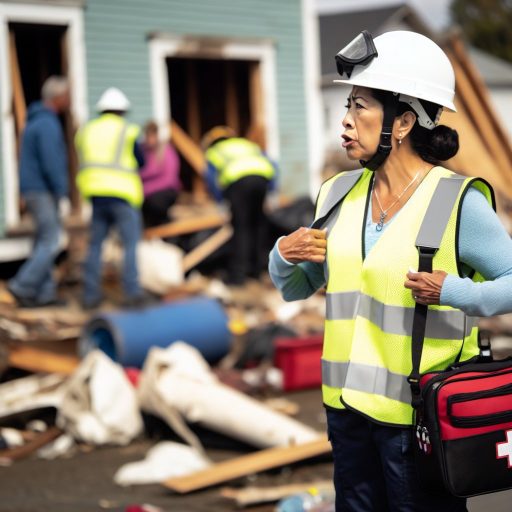Legal advocacy for domestic violence survivors involves providing support and representation to individuals who have experienced abuse.
It is crucial in helping survivors navigate the legal system and access justice.
Domestic violence survivors often face numerous challenges when seeking legal help.
These challenges can include fear of retaliation from the abuser, financial constraints, and lack of knowledge about legal rights.
Legal advocacy aims to address these barriers by offering guidance, protection, and resources to survivors.
By working closely with survivors, advocates can help them understand their legal options and make informed decisions.
Advocates also play a key role in connecting survivors with legal services, shelters, and other support networks.
Legal advocacy is essential in empowering domestic violence survivors and holding abusers accountable for their actions.
It is a vital component in the fight against domestic violence and ensuring that survivors receive the help and protection they deserve.
Types of Legal Advocacy Available for Domestic Violence Survivors
Legal Representation in Court
Domestic violence survivors can seek legal representation to navigate the legal system.
This representation helps them present their case effectively.
Obtaining Protective Orders
Survivors can obtain protective orders that legally require the abuser to stay away.
Failure to comply with these orders can lead to serious consequences.
Access to Legal Resources and Counseling Services
Survivors can access legal resources such as free legal aid.
Counseling services also support them through the legal process.
The role of a legal advocate in supporting domestic violence survivors
Legal advocates play a crucial role in supporting domestic violence survivors in various ways.
Legal advocates offer a listening ear and create a safe space for survivors to share their experiences.
They provide emotional support, validate survivors’ feelings, and empower them to make informed decisions about their situation.
Providing emotional support and empowerment
Legal advocates help survivors understand their legal rights and options.
They guide them through the complex legal system, explain court procedures, and assist in completing necessary paperwork such as protection orders or divorce filings.
Transform Your Career Today
Unlock a personalized career strategy that drives real results. Get tailored advice and a roadmap designed just for you.
Start NowAdvocates also accompany survivors to court hearings for moral support.
Assisting in navigating the legal system
Legal advocates act as the voice of survivors, advocating for their rights and safety.
They work with law enforcement, social services, and other agencies to ensure survivors receive the protection and support they need.
Advocates may also engage in legislative advocacy to push for policy changes that benefit survivors.
Advocating for the rights and safety of survivors
Find Out More: Building Trust with Children and Families
Barriers to Accessing Legal Advocacy for Domestic Violence Survivors
Legal advocacy plays a crucial role in supporting domestic violence survivors.
However, there are several barriers that can hinder their access to these services.
Understanding these barriers is essential in developing strategies to address them effectively.
Financial Constraints
One of the primary barriers that domestic violence survivors face when seeking legal advocacy is financial constraints.
Many survivors may not have the financial resources to hire an attorney or access other legal services.
This can prevent them from obtaining the legal assistance they need to navigate the complex legal system.
Without this assistance, survivors may struggle to seek justice for the abuse they have experienced.
Additionally, survivors may also lack access to resources that can help them cover the costs associated with legal advocacy.
Expenses such as court fees, transportation costs, and childcare can add to the financial burden.
Without adequate financial support, survivors may struggle to access the legal assistance needed to protect themselves and their families from further harm.
Fear of Retaliation from the Abuser
Another significant barrier to accessing legal advocacy for domestic violence survivors is the fear of retaliation from the abuser.
Many survivors may be hesitant to seek legal assistance out of fear that their abuser will retaliate against them or their loved ones.
This fear can prevent survivors from taking the necessary steps to protect themselves.
Moreover, survivors may worry that seeking legal advocacy will escalate the violence.
Showcase Your Business Today
Reach thousands of readers actively exploring professional services. Publish your business profile and grow your audience now.
Publish NowThis concern is particularly prevalent in cases where the abuser has threatened to harm the survivor if they seek legal help.
Overcoming this fear is essential in empowering survivors to access the legal assistance they need to break free from the cycle of abuse.
Lack of Knowledge About Available Resources
A lack of knowledge about available resources is another common barrier that domestic violence survivors face when seeking legal advocacy.
Many survivors may not be aware of the legal services and support systems available to them.
This lack of information can prevent survivors from seeking the help they need.
Additionally, survivors may face challenges in navigating the legal system without adequate information and support.
This lack of knowledge can hinder survivors from advocating for themselves effectively.
Providing survivors with information about available resources and support services is essential.
Such efforts empower them to access the legal advocacy they need.
Learn More: Rehabilitation Counseling: Self-Care for Professionals
Providing free or low-cost legal services
One of the most effective strategies for overcoming barriers to legal advocacy for domestic violence survivors is by offering free or low-cost legal services.
Many survivors may not have the financial means to hire a private attorney.
So having access to pro bono or affordable legal representation can be crucial in helping them navigate the legal system.
Implementing safety measures for survivors
Ensuring the safety of domestic violence survivors is paramount when engaging in legal advocacy.
This can include providing secure transportation to and from court proceedings.
It can also involve establishing safe spaces for survivors to meet with lawyers.
Implementing confidentiality protocols helps protect their privacy.
Increasing awareness about legal rights and resources through education and outreach programs
Educating survivors about their legal rights and available resources is key to empowering them to seek help.
Outreach programs can include workshops, seminars, and informational sessions.
These programs should cover topics such as protective orders, divorce proceedings, and access to support services.
By increasing awareness, survivors can make informed decisions about their legal options.
They can also feel more confident in seeking assistance.
Learn More: Effective Communication for Crisis Intervention Specialists

Case studies highlighting successful legal advocacy outcomes for domestic violence survivors
- Example 1: Obtaining a restraining order against an abusive partner
- Example 2: Securing custody of children in a domestic violence situation
- Example 3: Holding the abuser accountable in criminal court
Legal advocacy for domestic violence survivors is a crucial aspect of ensuring their safety and well-being.
Through various legal mechanisms, survivors can seek protection and justice against their abusers.
Here are some case studies that illustrate successful outcomes of legal advocacy:
Example 1: Obtaining a restraining order against an abusive partner
A domestic violence survivor, let’s call her Sarah, endured years of physical and emotional abuse at the hands of her partner.
With the help of a legal advocate, Sarah was able to obtain a restraining order against her abuser.
This legal document mandated that the abuser stay away from Sarah and her children, providing them with a sense of safety and security.
Example 2: Securing custody of children in a domestic violence situation
Another survivor, Emily, found herself in a custody battle with her abusive ex-husband.
Despite the challenges she faced, Emily’s legal advocate helped her gather evidence of the abuse and present a strong case in family court.
As a result, Emily was granted full custody of her children, ensuring their safety and well-being.
Example 3: Holding the abuser accountable in criminal court
One of the most critical aspects of legal advocacy for domestic violence survivors is holding the abuser accountable for their actions.
In a recent case, a survivor named Alex bravely came forward to press charges against her abuser.
With the support of her legal advocate, Alex testified in criminal court, leading to a conviction for the abuser.
This outcome not only brought justice to Alex but also served as a deterrent for other potential abusers.
These case studies demonstrate the power of legal advocacy in protecting and empowering domestic violence survivors.
By working with skilled and dedicated legal advocates, survivors can navigate the legal system and secure the protection and justice they deserve.
See Related Content: Training Programs for Crisis Intervention Specialists
Legal Advocacy for Domestic Violence Survivors
Legal advocacy for domestic violence survivors is crucial for their safety and well-being.
Showcase Your Business Today
Reach thousands of readers actively exploring professional services. Publish your business profile and grow your audience now.
Publish NowSurvivors are encouraged to seek help from legal advocates for protection.
Communities must prioritize and support legal advocacy services for survivors to create a safer environment.
Additional Resources
Civilian Advocate for Victims of Sexual and Domestic Violence …
Family Violence Program | Texas Health and Human Services
[E-Books for Sale]
The Big Book of 500 High-Paying Jobs in America: Unlock Your Earning Potential
$19.99 • 500 High-Paying Jobs • 330 pages
Explore 500 high-paying jobs in America and learn how to boost your career, earn more, and achieve success!
See All 500 High-Paying Jobs of this E-Book
1001 Professions Without a Degree: High-Paying American Jobs You Can Start Now
$19.99 • 1001 Professions Without a Degree • 174 pages
Discover 1001 high-paying jobs without a degree! Unlock career tips, skills, and success strategies for just $19.99!




